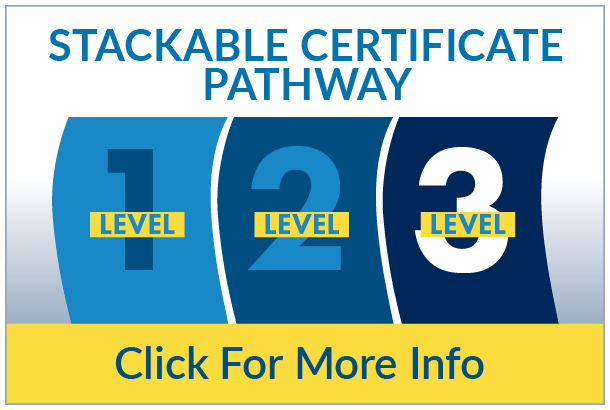In order to graduate with a concentration, students must take four (4) courses as indicated below under each concentration.
Business Intelligence and Data Analytics
Strategic Leadership in the 21st Century
Information Technology Management
Applied Computer Science
Concentration in Business Intelligence and Data Analytics (STEM)
The DBA Concentration in Business Intelligence & Data Analytics (BIDA) prepares business executives with the knowledge and acumen to solve complex business problems, enabling organizations to remain competitive in the 21st-century globalized economy. Through the use of data analytics and Business Intelligence (BI) tools, doctoral students will gain valuable insights about customers, competitors, internal operations, and external variables that influence organizational strategy, and will enhance their ability to make better strategic decisions. Doctoral students will analyze business data and be able to improve the efficiency and effectiveness of business operations and also become fastidious about future predictions and strategic implementation. The curriculum is purposeful in integrating BI & DA concepts, theories, and practices that are in alignment with industry-recognized professional certifications in BI & DA from Microsoft, tdwi, Google, and Qlik. This concentration builds a strong foundation in executive analytics that will enable doctoral students to utilize business intelligence tools such as artificial intelligence (AI), predictive and prescriptive analytics, and decision support systems.
DATA 800 Foundations in Analytics for Executives - 3 credit hours
DATA 801 BI, Analytics, & Decision Support - 3 credit hours
DATA 802 Time Series & Predictive Analysis for Business - 3 credit hours
DATA 803 Artificial Intelligence & Prescriptive Analytics* - 3 credit hours
Concentration in Strategic Leadership in the 21st Century
Expectations are high for the changes this decade is likely to bring to the workplace. Leadership influencers are forecasting challenges that leaders will face as a new level of workplace transformation continues to be shaped by accelerating technology changes, increasing consumer expectations, and hyper-connectivity. The goal of this concentration is to prepare students to meet these challenges by introducing the concepts of Artificial Intelligence (AI), Work Culture, Employee Experience, Data, Change, Analytics, Diversity, Productivity, Automation, and Well-Being.
BUS 810 Building Positive Relationships in a Multigenerational Workforce - 3 credit hours
BUS 811 Emotional Intelligence in Transformational Leadership - 3 credit hours
BUS 812 Emerging Technology for Effective Leadership - 3 credit hours
BUS 814 Global Leadership - 3 credit hours
Concentration in Information Technology Management (STEM)
The DBA Concentration in Information Technology (ITM) prepares doctoral students with the knowledge and acumen required to attain roles as senior directors and executives, leading functional information technology systems and business-related technology divisions and/or units. The ITM concentration curriculum is designed to enable business and technology administrators to lead and manage enterprise-wide IT projects and to solve complex business and IT problems. Emphasis is placed on projects that ensure digital assets security as well as on developing the expertise to implement a governance and management enterprise IT infrastructure. Modern and advanced topics in ITM such as data analytics in project management or investigated. Doctoral students will gain valuable insights into the strategic frameworks needed to sustain competitive advantage through the use of IT and other emerging technologies. This concentration has its design roots in the Project Management Institute (PMI) Guide to the Body of Knowledge (PMBOK), so qualified candidates can be prepared to sit for industry-recognized certification(s) (CIO Magazine ranked the PMP as the top PM certification worldwide) such as the Certified Associate in Project Management (CAPM), Project Management Professional (PMP), and/or the Portfolio Management Professional (PfMP). In addition, qualified candidates can be prepared to sit for the industry-recognized certification for the Certified Governance of Enterprise IT (CGEIT) credential and/or the Certified Information Security Manager (CISM) credential. At the enterprise-level, organizations must rely on senior directors and executives to ensure that industry standards regarding the compliance and governance of IT infrastructure are in place and adhered to. Thus, a purposeful effort to align part of the curriculum with the Information Systems Audit and Control Association (ISACA), an accepted Information Systems Knowledge and Practice platform, has been made to ensure graduates have the essential knowledge needed to administer enterprise IT governance. Finally, the ITM concentration delves into advanced IT topics such as Business Intelligence (BI) and the enterprise-level management of information systems (MIS) to ensure that graduates have a meaningful, substantial, and momentous impact on the organization through a holistic technology leadership approach.
BUS 820 Business Intelligence & Information Systems - 3 credit hours
BUS 821 Management Information Systems & Advanced IT - 3 credit hours
BUS 822 Information Technology Project & Portfolio Management - 3 credit hours
BUS 823 Governance of Enterprise IT Initiatives - 3 credit hours
Concentration in Applied Computer Science (STEM)
The DBA Concentration in Applied Computer Science (ACS) prepares doctoral students with the knowledge and acumen required to attain roles as senior directors and executives, leading functional computer science, software, information systems, and technology business-related divisions and/or units. The ACS concentration curriculum is designed to enable technology administrators to lead enterprise-wide initiatives in software engineering and computer science that incorporate relevant, current, and emerging technologies for the purpose of sustaining competitive advantage, while expanding and adapting new computer science and industry standards, frameworks, and best practices. Part of the ACS curriculum is aligned with the International Information System Security Certification Consortium’s (ISC)2 Certified Secure Software Lifecycle Professional (CSSLP) certification, and CompTIA’s Advanced Security Practitioner (CASP+) certification, so qualified candidates can be prepared to sit for these industry-recognized certifications. Graduates will be prepared to establish and direct long-term strategic goals, policies, and related procedures for the organization’s technology and software development programs. This exciting concentration delves into software engineering concepts, Business Intelligence (BI), analytical tools to support organizational decisions, software security design principles, and examines the virtual and augmented world of Human Computer Interaction (HCI) and various Intelligent User Interfaces (IUI) in preparation for the next wave of a more dynamic interconnect between humans and machines.
BUS 801 BI, Analytics, & Decision Support - 3 credit hours
BUS 830 Software Engineering Concepts - 3 credit hours
BUS 831 Security in Software Design & Development - 3 credit hours
BUS 832 Human-Computer Interaction (HCI) Design - 3 credit hours
Concentration in Web Development & Applications Management Concentration
The Full Stack Coding Bootcamp offered by Westcliff University is a multidimensional certificate program that bridges a path for students who want to pursue careers in the growing and exciting field of web development. The program focuses on creating dynamic and interactive experiences through a rigorous full stack coding curriculum. Students pursuing this program will gain the necessary skills for front-end and back-end development, all while preparing them for success in the professional world.
WEB 840 Front End Web Development - 4 credit hours
WEB 841 Back End Web Development - 4 credit hours
WEB 842 Advanced Full Stack Web Development - 4 credit hours










